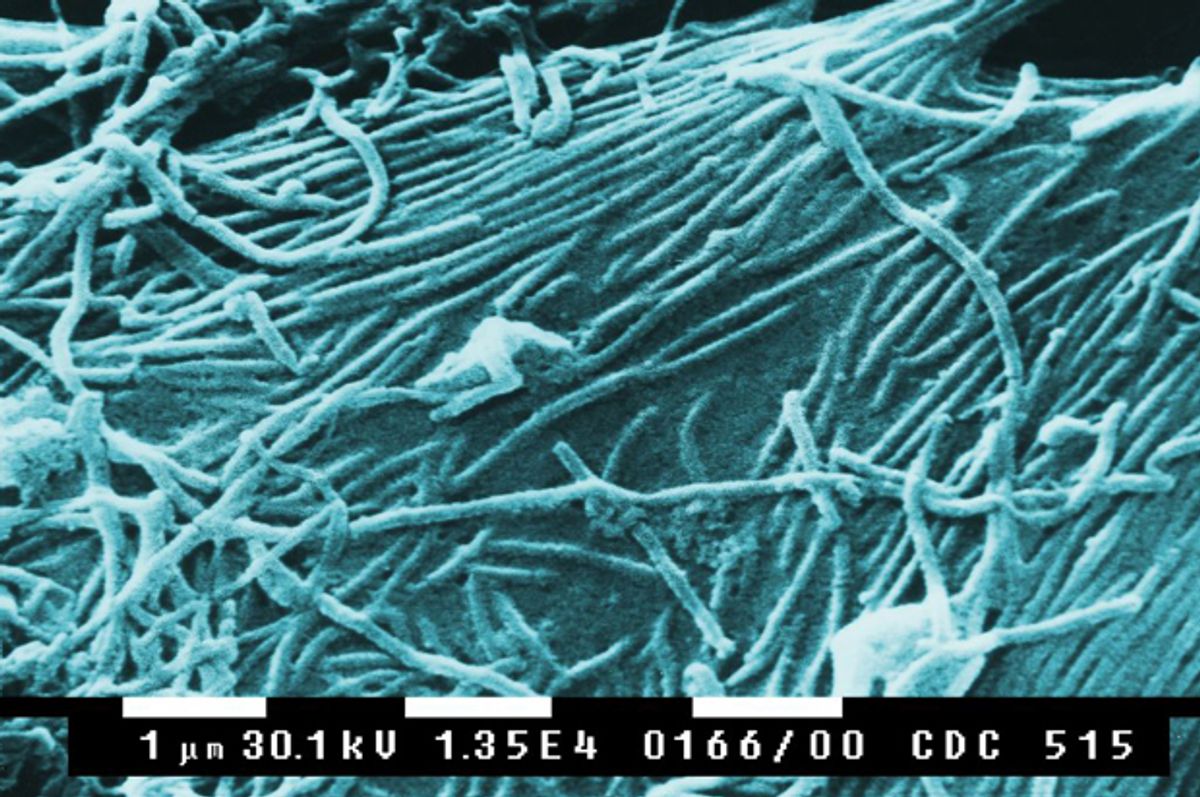Oh dear. Over at io9, Mark Strauss has taken a deep dive into the online message boards of the anti-vaccine movement, and found them teeming with conspiratorial theories about the Ebola outbreak.
This was probably bound to happen once it was announced that human trials of potential Ebola vaccines have begun. According to Strauss, some anti-vaxxers have latched onto the outbreak as evidence of a CDC plot to distract us from the (disproven) link between vaccines and autism. More disturbingly still, others are calling it "yet another fake pandemic set up to poison us with drugs and vaccines." Just like everyone else who's transposed their own political agendas onto Ebola, it's sad, if not surprising, that this contingent's done the same.
Given what we've seen of the anti-vaxxer movement's potential to do serious damage to medical progress, it's also downright terrifying.
From the early stages of West Africa's outbreak, experts have listed stigma and fear surrounding Ebola as factors contributing to its unprecedented spread. False beliefs among those living in the nations hit hardest by the disease -- including the rumor that the entire outbreak is a hoax -- have prevented people from seeking care and, in some reported cases, incited violence against health care workers. The New York Times' Upshot blog documented some of the examples from abroad of conspiracy theories turning deadly:
When a crowd, angered at a sudden quarantine and the transfer of patients, overran a clinic in Monrovia, Liberia, on Aug. 16, the idea that Ebola was a hoax played a role. The intruders, some of whom yelled, “There’s no Ebola,” not only came into contact with infected patients (many of whom fled) but also looted the facility of equipment. The gear may have included contaminated materials that further spread the contagion.
...This kind of misinformation, along with fear of contagion, has led to some health workers’ coming under attack, being blocked from entering affected areas or being spurned by their own communities. Workers have also encountered conspiracy theories that Ebola was brought to the region by Westerners.
Now, some of those theories are making their way to the United States. Strauss cites a panic-laden editorial written for the Liberian Observer by one Dr. Cyril Broderick that is apparently showing up on a number of anti-vaxxer sites. (It also arrived, via someone who thought it "might be of interest," in my own inbox Monday night.) In it, Broderick claims that Ebola is a genetically modified organism manufactured by the U.S. and alleges that the government "has been operating a viral hemorrhagic fever bioterrorism research laboratory in Sierra Leone." Others fear that the epidemic, whether real or imagined, is being co-opted by health officials and the media as an excuse to push vaccines when, apparently, "natural alternatives" like homeopathic spider venom and vitamin C could cure the disease (suffice it to say that's unproven).
It's this same mix of junk science and fear mongering that, by encouraging people to refuse vaccinations, has lead to a resurgence of communicable childhood diseases that we'd already managed to eliminate. In California, a whooping cough outbreak reached epidemic proportions this summer. In 2010, when the last epidemic occurred, public health officials found a strong association between case clusters and areas with low vaccination rates. This year, the U.S. had seen 18 outbreaks and 594 cases of measles: a record high since 2000, when the disease was declared eradicated in this country. And while that disease can lead to some nasty complications, even in its heyday it was far less deadly than Ebola.
It's extremely unlikely that we're going to see an Ebola outbreak in the U.S., where our health care system, despite some high-profile screw-ups, is on high alert and prepared to contain isolated cases. Despite rumors that the U.S. government is planning to implement mandatory Ebola immunizations, a vaccine, once proven to be safe and effective, would most likely be used to protect health workers in West Africa, who run an actual risk of getting infected. But we've already seen how fear and misinformation are making an out-of-control epidemic even tougher to contain. The last thing we need is for anti-vaxxers to keep fanning those flames.

Shares